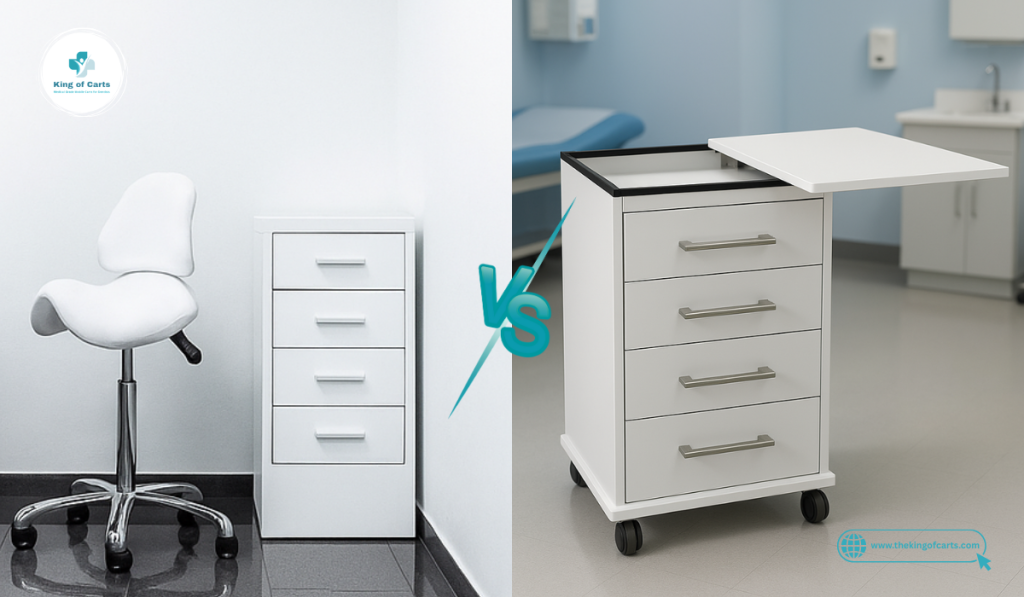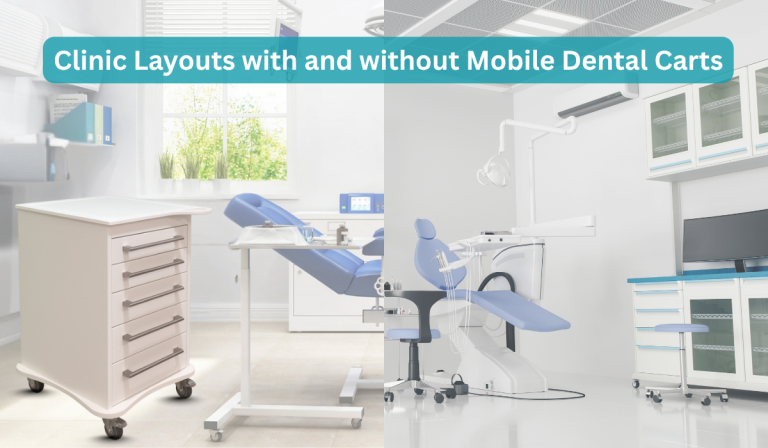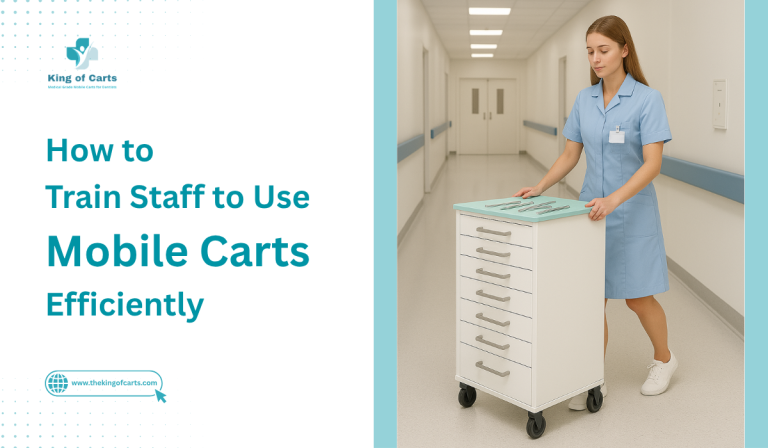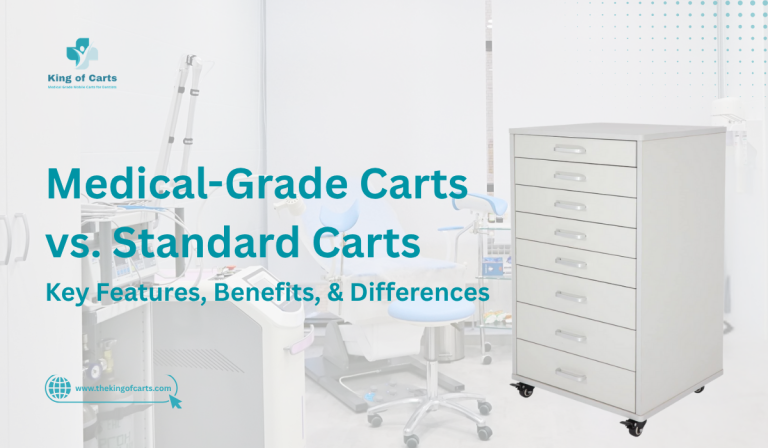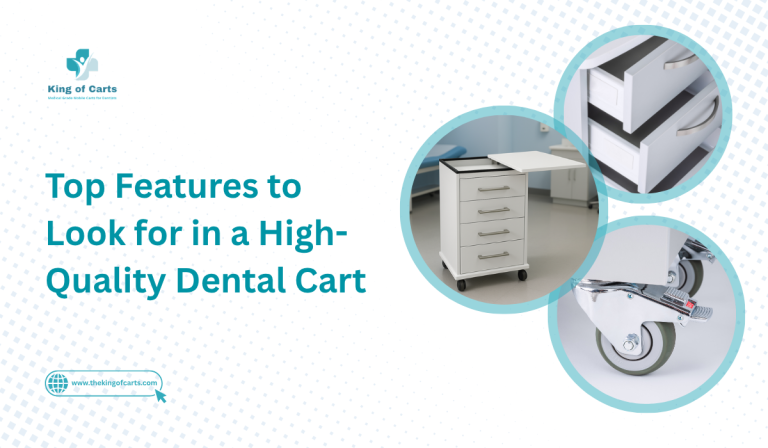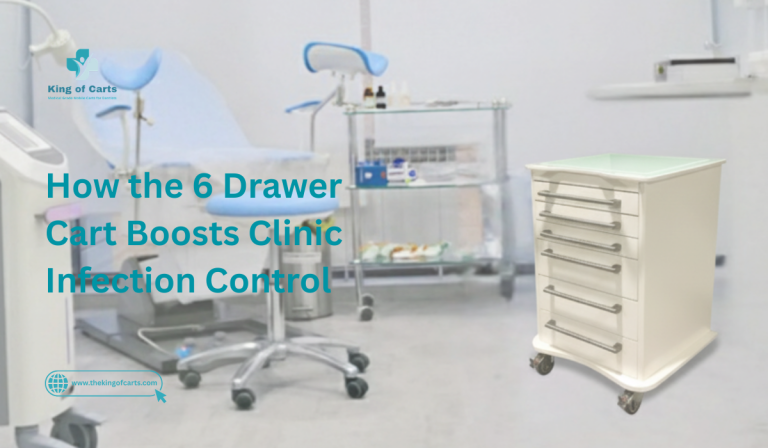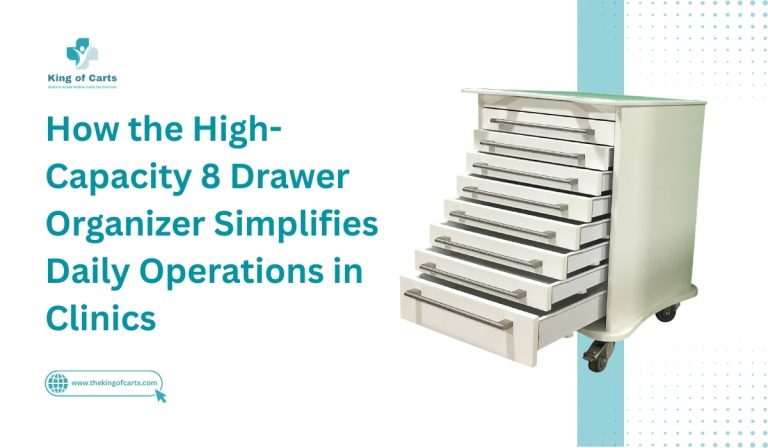The success of a dental practice isn’t determined only by the skills of its dentists or the technology used—it’s also shaped by the workflow and efficiency of everyday operations. One crucial element that often goes unnoticed is how storage is organized. From instruments and disposables to larger equipment, having the right storage solution can mean the difference between a smooth, patient-friendly experience and a cluttered, stressful work environment.
Traditionally, fixed cabinets have been the go-to choice for dental clinics. Their built-in, permanent design offers a professional appearance and ample storage. However, as dental practices evolve and demand greater flexibility, mobile dental carts have emerged as a smarter, more adaptable solution. They provide mobility, cost savings, and scalability that suit modern practices of all sizes.
In this blog, we’ll compare both options, highlight their pros and cons, and show you why mobile carts often come out on top as the best investment for future-ready dental clinics.
What are Mobile Carts
Mobile carts are movable storage units on wheels designed specifically for dental environments. They feature drawers, shelves, and compartments to store instruments and materials while being lightweight enough to roll between operatories.
These carts are a favorite among modern dental practices because they eliminate the need to duplicate instruments in each operatory. Instead, a single well-stocked cart can be moved to where it’s needed, saving time and money. Their adaptability makes them an excellent choice for clinics that handle varied treatments or anticipate future expansion.
Benefits of Mobile Carts
Mobile carts bring a host of advantages that align perfectly with the demands of modern dentistry. Let’s look at why they’re becoming the preferred choice:
1) Flexibility and Mobility
Mobile carts can move seamlessly between treatment rooms, allowing staff to bring the necessary instruments directly to the chairside. This reduces downtime, improves workflow, and ensures patients receive faster, more efficient care.
2) Cost-Effective Setup
Unlike custom-built cabinetry, mobile carts don’t require heavy installation costs. They offer a budget-friendly solution for new clinics and growing practices, providing reliable storage without straining finances.
3) Space-Saving Design
In smaller practices where every square foot counts, mobile carts fit perfectly. Their compact design keeps operatories uncluttered and efficient, allowing dentists to maximize treatment space without sacrificing functionality.
4) Scalability as You Grow
As your practice expands, you can easily add more mobile carts to increase storage. Unlike fixed cabinets that lock you into one layout, carts give you freedom to adapt to changing demands and services.
5) Antimicrobial Technology
Many modern mobile carts are built with antimicrobial surfaces that resist the growth of bacteria and germs. This technology enhances infection control, supports sterilization protocols, and provides patients with a cleaner, safer environment.

What are Fixed Cabinets
Fixed cabinets, on the other hand, are permanent built-in storage systems installed directly into the operatory or sterilization area. They are usually custom-designed to fit the space and layout of a dental clinic, providing a seamless, professional look.
Their strengths lie in durability and capacity. Fixed cabinets are ideal for storing bulk supplies and larger equipment, making them popular in large, well-established practices. However, their permanent nature means they require a higher upfront investment and offer little flexibility if the clinic’s layout or needs change over time.
Benefits of Fixed Cabinets
While mobile carts dominate in flexibility, fixed cabinets are not without their strengths. They remain a strong choice for certain practices.
1) Ample Storage Space
Fixed cabinets offer extensive storage for instruments, disposables, and equipment. They are especially useful for practices that handle a large patient volume and need to store bulk supplies.
2) Custom Appearance
Custom cabinetry creates a polished, uniform look that enhances the overall image of the clinic. Patients often associate a clean, built-in environment with professionalism and high-quality care.
3) Durability and Longevity
Made from sturdy, medical-grade materials, fixed cabinets are designed to withstand years of constant use. They provide a strong, reliable solution for practices that don’t anticipate frequent changes.
4) Systematic Organization
With customizable compartments and drawers, fixed cabinets make it easier for staff to organize supplies. This structured approach reduces misplacement and ensures smoother day-to-day operations.
Potential Drawbacks
Every storage solution comes with its own set of limitations. Understanding these will help you make an informed decision.
Mobile Carts:
- Provide less storage than built-in cabinetry
- Need to be cleaned more frequently due to mobility
- Can cause clutter if not well-organized
Fixed Cabinets:
- Require high upfront investment and installation
- Offer no flexibility once installed
- Occupy valuable floor and wall space, reducing adaptability
Mobile Carts vs. Fixed Cabinets: Key Differences
| Feature | Mobile Carts | Fixed Cabinets |
| Mobility | Easily moved between operatories | Stationary, permanently installed |
| Cost | Affordable, lower upfront investment | Expensive, requires installation |
| Flexibility | Adaptable, scalable as practice grows | Fixed layout, hard to adjust |
| Space Usage | Compact, space-efficient | Occupies permanent space |
| Durability | Moderate, may need replacement sooner | Long-lasting, heavy-duty materials |
| Best For | Modern, growing, or small clinics | Large, established practices |
Hybrid Storage: A Balanced Approach
Many practices today find success in using a hybrid storage system. Fixed cabinets are installed in sterilization or storage areas for bulk supplies, while mobile carts are kept chairside to provide flexibility during treatments. This combination balances permanence with adaptability, ensuring efficiency and organization across the clinic.
Conclusion
When weighing mobile carts vs. fixed cabinets, the choice ultimately comes down to your clinic’s size, budget, and long-term vision. Fixed cabinets deliver durability, ample storage, and a custom look—but they can also be costly and restrictive. Mobile carts, however, bring unparalleled flexibility, affordability, and scalability, making them a smarter, future-ready choice for modern practices.
By investing in mobile carts, you empower your dental team with the ability to work more efficiently, adapt to changing needs, and create a smoother experience for patients. And for clinics that want both permanence and flexibility, combining fixed cabinetry with mobile carts delivers the best of both worlds. In today’s evolving dental industry, mobility is power—and mobile carts give your practice the adaptability it needs to thrive.
